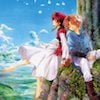| View previous topic :: View next topic |
| Author |
Message |
|
|
Dessa
 Joined: 14 Jul 2004
Joined: 14 Jul 2004
Posts: 4438
|
 Posted: Sun Aug 23, 2015 6:48 pm Posted: Sun Aug 23, 2015 6:48 pm
|
 |
|
|
I wanted to write an essay or something on this, but that would require actually gathering my thoughts all at once, which isn't something I'm good at. So I'll do a thread and let others voice their opinions as well, and then maybe write something down once I get all my thoughts out a bit at a time.
Whenever there's an adaptation of anything that goes from one format to another, there are going to be comparisons between the two, often focusing on the accuracy between the source and the adaptation. This doesn't matter if it's manga to anime, novel/light novel to anime/manga, novel to film, etc.
There's a number of reasons why adaptations might make changes. The source material being unfinished, for one, especially with ongoing manga series. Having a limited amount of episodes to adequately convey all of the information in the source. Sometimes things that work in one medium don't work in others. Or even just that the writer(s) of the adaptation want to focus on a different aspect, or even change what the source has to say. Sometimes these changes can be for the better, and sometimes for the worse.
Then there's adaptations that take the other route, and recreate the source material as faithfully as possible. Sometimes this works really well (as in the case of Fullmetal Alchemist: Brotherhood), and sometimes it doesn't (as in the case of Sailormoon Crystal).
And then there's still others which do a mix, faithfully recreating some parts, and and then skipping or changing others, often for some of the reasons above.
What are your thoughts? Is the importance on the faithfulness of the adaptation? Is it on the adaptation capturing the spirit of the source material? Or is it simply that the adaptation is entertaining in its own right?
For me, it depends on the purpose. Howl's Moving Castle, for example, made no bones about it not being an accurate adaptation, and both versions are enjoyable in their own rights.
Sailormoon Crystal, on the other hand, focused so completely on being an accurate adaptation, that it lacked the "heart" of not only the manga, but the original anime and the tokusatsu, as well. Not anime, but The Mortal Instruments: City of Bones also focused too much on including every little thing in the movie, that I was bored. At least a half hour could have been taken out of that movie to tighten things up.
|
| Back to top |
|
|
|
Touma
 Joined: 29 Aug 2007
Joined: 29 Aug 2007
Posts: 2651
Location: Colorado, USA
|
 Posted: Sun Aug 23, 2015 7:18 pm Posted: Sun Aug 23, 2015 7:18 pm
|
 |
|
| Dessa wrote: | | What are your thoughts? Is the importance on the faithfulness of the adaptation? Is it on the adaptation capturing the spirit of the source material? |
I have changed my mind about this several times over the years. My final (?) thought is that I really do not care.
I can see potential advantages in being faithful, capturing the spirit, or even taking the general idea and doing something completely different with it.
| Quote: | | Or is it simply that the adaptation is entertaining in its own right? |
That is it.
As long as I enjoy the final result I am satisfied.
I have nothing against a faithful adaptation, but I do not require one either.
|
| Back to top |
|
|
|
lys
Encyclopedia Editor
 Joined: 24 Jun 2004
Joined: 24 Jun 2004
Posts: 1017
Location: mitten-state
|
 Posted: Sun Aug 23, 2015 8:01 pm Posted: Sun Aug 23, 2015 8:01 pm
|
 |
|
|
I thought this was going to be about adaptations of manga scripts (as part of the translation process). But that's a whole 'nother thing, haha. And this is an interesting topic :)
I think that I am the type to get huffy when I notice minor differences, but at the same time I do understand the need for changing some things, and recognize that I am being petty. For my own happiness, I usually stick with the original (in the case of manga, I prefer the reading experience to the watching experience anyway) and check out the adaptation only if I love it enough to want supplemental material or an alternative take on things.
I do think conveying/maintaining the "heart" of the work is the most important thing, and I believe that can be done with both a faithful and a more liberal media adaptation. In the case of something like Howl's Moving Castle... haha. I really don't even think of them as the same thing, and enjoy both for what they are. But I can do that because they're both good in their own ways: if the movie were a liberal adaptation of the book and was just plain lousy on its own, there'd be no redeeming it.
|
| Back to top |
|
|
|
Princess_Irene
ANN Associate Editor
 Joined: 16 Dec 2008
Joined: 16 Dec 2008
Posts: 2656
Location: The castle beyond the Goblin City
|
 Posted: Mon Aug 24, 2015 7:21 am Posted: Mon Aug 24, 2015 7:21 am
|
 |
|
I tend to go with the idea that the heart of the work is more important, but I also had to get over a lot of inbred literary snobbery to come to that decision. (I'm an English professor, daughter of an English teacher, and granddaughter of a librarian.) For example, my favorite Pride and Prejudice adaptation is still the BBC one from the 1990s because of its fidelity to the book, but I still enjoyed the book Pride and Prejudice and Zombies for its use of the original to do something totally different.
Language doesn't always lend itself to easy translations, so I think that it becomes necessary to tinker with an adaptation to get the original idea or intent across. The best example in manga that I can think of is Peter White's rhyming dialogue in the Alice in the Country of _______ franchise. No, he doesn't speak in rhyme in the original Japanese, but by giving him that quirk in English, we can better understand the kind of character he's meant to be. We also run into that sort of issue when a language uses a gender-neutral pronoun, since we don't have any (widely agreed upon) gender-neutral pronouns in English. Defaulting to "he" doesn't convey the same meaning, but that still seems to be the knee-jerk reaction, since there's some controversy about "they" as a singular. (In academia, anyway!)
In terms of transition from the page to the screen, there are additional considerations, like narration, that have to be factored in. Emma is a good example of it done well - little sounds like gasps had to be added in to convey Kaoru Mori's original "speaking glances" and it really worked. Alternatively the Howl's/Arrietty method of reworking the print material for screen or for a foreign audience can work, but I feel like it's riskier.
Okay, shutting up now.  Dessa, I think this is a great idea for an essay! Dessa, I think this is a great idea for an essay!
|
| Back to top |
|
|
|
Alan45
 Village Elder
 Joined: 25 Aug 2010
Joined: 25 Aug 2010
Posts: 10032
Location: Virginia
|
 Posted: Mon Aug 24, 2015 6:45 pm Posted: Mon Aug 24, 2015 6:45 pm
|
 |
|
|
I think an anime should be faithful to the source material to the extent of telling the same story, using the same characters and having the same "tone" for want of a better word. Beyond that, I have no problem with the adaption moving scenes around and leaving out (or adding) inconsequential bits. Frankly a "too" faithful adaption can be a bit boring and can come across like a too literal translation, stiff and awkward.
Each format, novels, manga and anime has its own strengths and weaknesses. They use different methods of showing character and plot elements. To tie them too closely together is a mistake.
On the other hand, I don't care for anime only endings. A season shouldn't end on a cliff hanger unless the next season is already green lit but coming to the end of an arc when the final goal has not been reached is fine. If you enjoy the characters in a show, it is nice to believe that life goes on outside your view.
Something that in my opinion almost never works is going backwards from and anime or live action show to a manga or novel adaption. I'm not sure why but they always seem superficial. The problem I have with the first Index novel is that it reads like the novelization of a screen play. I'm not sure why since I think the novel came first.
Like lys above, I'm more of a reader than a watcher. However, if I like a story in one format, I will try it in as many variations as are available. Here in the US the problem is that the availability is usually the reverse of Japan. We often get the anime first and if popular may get the manga or novel version much later.
|
| Back to top |
|
|
|
killjoy_the
 Joined: 30 May 2015
Joined: 30 May 2015
Posts: 2480
|
 Posted: Mon Aug 24, 2015 6:49 pm Posted: Mon Aug 24, 2015 6:49 pm
|
 |
|
| Alan45 wrote: | | The problem I have with the first Index novel is that it reads like the novelization of a screen play. I'm not sure why since I think the novel came first. |
The novel came out a few years first. Maybe it's the writing style, or do you mean that the anime was so faithful to the novel that reading it was just retreading the same things? I'd recommend reading the second novel, since the content has quite a bit of differences from what the anime adapted, if it's the latter.
|
| Back to top |
|
|
|
Alan45
 Village Elder
 Joined: 25 Aug 2010
Joined: 25 Aug 2010
Posts: 10032
Location: Virginia
|
 Posted: Mon Aug 24, 2015 7:49 pm Posted: Mon Aug 24, 2015 7:49 pm
|
 |
|
|
@killjoy_the
I was fairly sure the novel was first. The anime was rather faithful to the first novel. However, the style of the novel was very "chatty" and sounded like someone trying to describe what they had seen on screen. It was just an impression, but it got me bogged down in reading it. I should probably soldier on and read it as I have the next three volumes already waiting. So much to read ...
This is a good example of the source material becoming available much later than the anime.
|
| Back to top |
|
|
|
molloaggie
 Joined: 30 Jun 2003
Joined: 30 Jun 2003
Posts: 578
Location: Texas
|
 Posted: Sat Aug 29, 2015 8:07 pm Posted: Sat Aug 29, 2015 8:07 pm
|
 |
|
|
Over the years, I've mellowed out and learned to enjoy both of them for what they are. I used to get so frustrated if the animators changed anything at all.
Sometimes I wish the animators would expand the story a bit, flesh it out, just to give us more. Full Moon O Shigashite was one of the best anime expansions that I've enjoyed.
|
| Back to top |
|
|
|
|